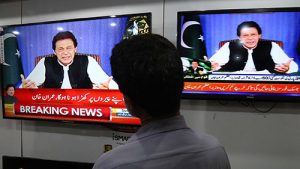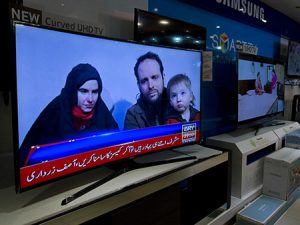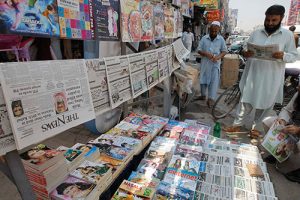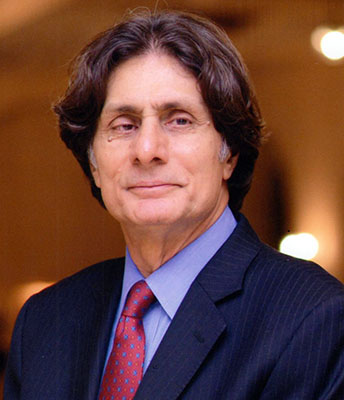If they take away my ink and pen
Grieve I shall not
For my fingers shall drip
In the blood of my heart
If they seal my tongue
Complain I shall not
For the links of every chain
Shall recite my words
Faiz Ahmad Faiz
After the Parliament, the Executive and the Judiciary, Media has been a fervent claimant of being the fourth pillar of the state. While its traditionally proclaimed role may validate that claim, a critical enquiry that begs an answer is whether it has evolved adequately through a process of self-critique, censure, course-correction and upholding of a professional ethical base that it could wear the crown comfortably? Much that I think about it and much that I talk about it with the best among the journalist community, I have not been able to get a definitive input. And there are substantive reasons why it is so.
Media has grown phenomenally since, ironically, a dictator granted it the freedom that it enjoys today. There are many who claim that they won it as a consequence of a concerted struggle spread over a number of years. But there are naysayers who rebuff that claim. Nevertheless, it must not be forgotten that, under the so-called democratic rules, media remained in chains which only tightened further with the induction of each new incumbent. It is also in undergoing this cycle of growth that it contracted certain maladies which have aggravated with the passage of time, raising doubts about it occupying the pedestal on a par with other pillars of the state.
It is an acknowledged reality that media is integral to the development of the country as well as the principal means to creating awareness among people and sensitising them to the gravity of issues of the time. While these issues may reflect partisan, often combative narratives, it is the journalist’s prime duty to communicate them dispassionately, objectively and without giving it an angle or a slant which may favour one side or the other. It is here that the real professional worth and expertise of the journalist community comes into play. Finding a breed of journalists who do not have their own political views is a difficult proposition, but requirements of the profession demand objectivity at the time of filing reports and conducting programmes. This is both a need as well as the zenith of a journalist’s professional duty.

The history of journalism in Pakistan is a tainted one. While there have been some of the very finest in the profession, we have also cultivated a tradition of journalism becoming a tool in the hands of usurpers and political charlatans pretending to be democrats who have come to rule this country. We also have cases of journalists stooping to promoting one or the other political view and, consequently, losing their objectivity. In the process, journalism has been reduced to becoming a business comparable with any other which is engaged in an array of activities for making profit in exchange for the written and spoken word.
In the current context, there is an ever-increasing need for objective and substantive journalism that would deal with causes of value and consequence. On the contrary, what is witnessed is a spate of pontiffs engaged in the task of passing judgements about one or the other person, or one or the other party, thus exposing themselves and their profession to justifiable criticism from either side of the divide. When journalists become a party to a division, journalism loses its value and relevance in a given context.
This is so evident from the talk shows which are aired every evening. At the very outset, the anchor states his position which is overwhelmingly partisan one way or the other. The rest of the programme is devoted to eliciting praise from the side that the anchor has aligned with. In between, there is nothing of substance which is discussed. After the opening salvo, the anchor is busy managing the programme to ensure the outcome that was stated at the beginning and come out the winner in a battle of absurdities and innuendos shorn of any value and relevance to the given subject.

Then there are statements made, in the written and the spoken word, which have no basis and which, at times, are totally contrary to the facts. In spite of credible knowledge available, there is an insane insistence on continuing to orchestrate the chosen narrative. Even when the transmitted information is contested with evidence, there is no expression of regret and no effort to put things in the right perspective. It is as if journalism is not accountable to enquiry and censure. It is as if the spoken and the written word is holy gospel which cannot be contested in any manner at any forum which, incidentally, also reminds me of our judiciary.
In spite of proclamations that it is in the pipeline, there has been no sincere effort to chalk out an ethical code that journalism, like any other profession, is required to conform to in the discharge of its duties. If the government tries to regulate it by enacting appropriate laws, the initiative is met with protests dubbing it as an attempt to curb the freedom of media. In a fledgling democratic environment, the government is left with no option but to back off, thus leaving the field open for the media practitioners to make merry. That again reminds me of that other pillar which, on account of some extremely controversial injunctions, has virtually driven itself beyond the domain of the law.
In a recent article that I scribbled for another publication, I summed up the grave dilemma as an innate habit which the media practitioners have become accustomed to: “They refuse to undertake any substantive evaluation of an issue by furnishing facts and figures in favour and against their take. Instead, they make use of intense rhetoric to promote their individual brand of narrative and expect people to believe it also. They seem to be smitten by the spice of the hyperbole, not the rationale of the argument. They are addicted to the command of the pontiff, not the reason substantiating their narrative. They are enamoured by an artificially-created perception, not the need for advancing the cause of a pragmatic debate. They are playing to the gallery of sponsors and stooges, not driven by the cardinal journalistic mission to inform and enhance awareness about the existent issues. So, what we have ended up with is mostly an agenda- and interest-driven narrative, not an objective and dispassionate discourse”.

The media has come a long way since those draconian days of dictatorship, but there are miles to go to turn the profession into an honourable undertaking that would be managed according to laid down principles which will give it the stature and respect that it deserves. It is not to be leased out to a coterie of dishonest people who have corrupted it for money making. It has to be extricated from their grip to initiate a serious and sincere effort to turn it into a profession to be pursued by the just, the honourable and the principled. That is where it belonged and that is where it must return to.
Faiz sahib had a quintessential approach to the profession. He had irremediable faith not to be deterred by the harshest containments and conjured up the vision of his fingers dripping in the blood of his heart and the links of the chains reciting his words. There was no stopping him from speaking the truth. It is this call of the truth that beckons all who are associated with journalism to pick up their cudgels and wage a battle for raising the stature of the profession to where it deserves to be. It is a long haul, but it is a journey that must commence before any irreparable damage is inflicted upon the profession which has been the pursuit of some of the most distinguished people in this country, Faiz sahib being one among the illustrious company.

The writer is a Special Assistant to the Prime Minister on Information.




دیکھنا تقریر کی لذت کہ جو اس نے کہا
میں نے یہ جانا کہ گویا یہ بھی میرے دل میں ہ
Reflects thoughts of all of us.